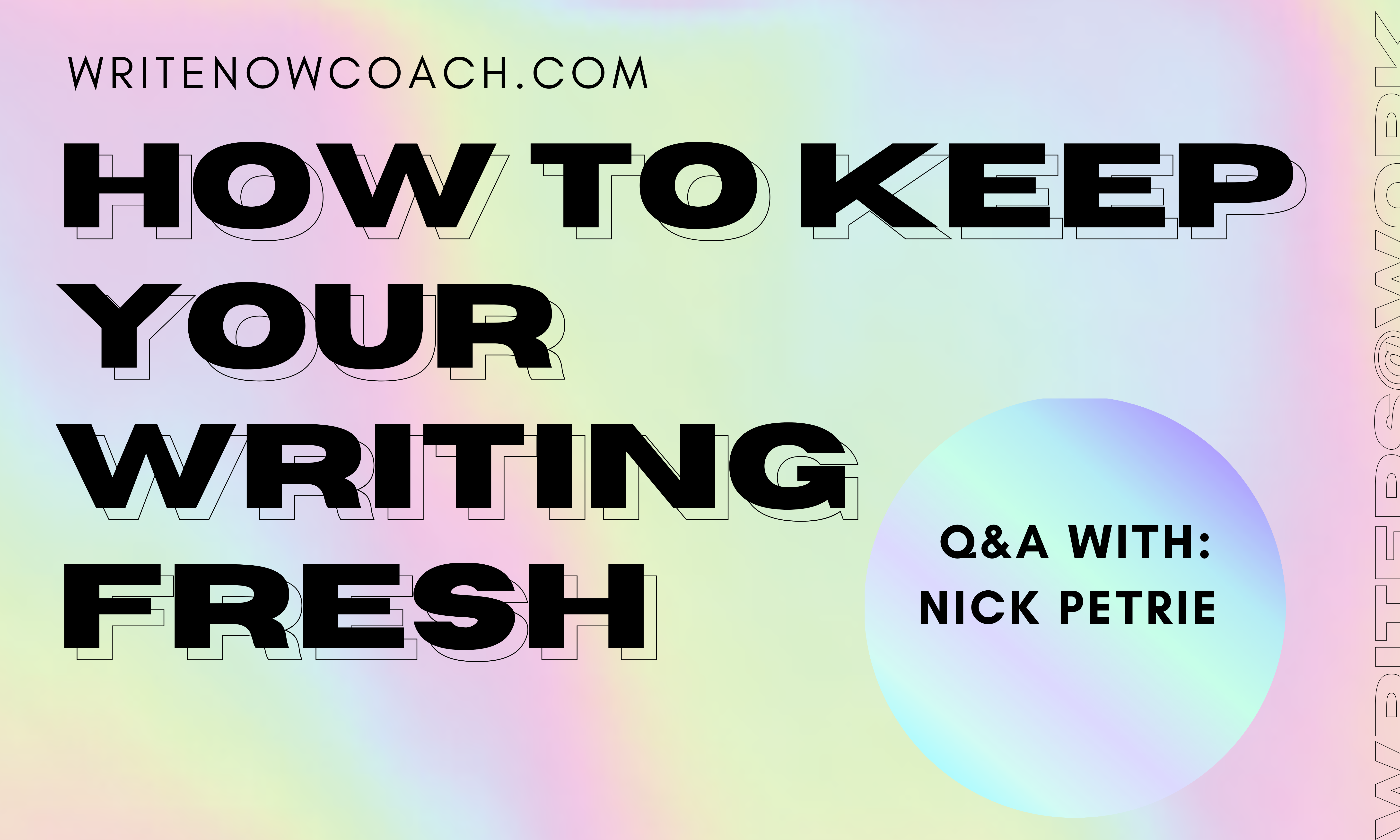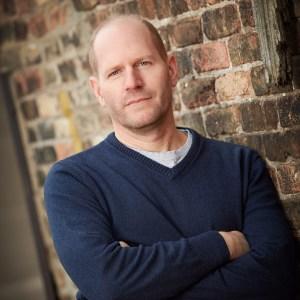How to Keep Your Writing Fresh
January 12, 2021
Note From Rochelle
Dear Writers,
Is writing a book on your bucket list?
It may be easier than you think.
If you’ve kept a blog, written a newsletter, or taught a multiple-week class—you might have enough content to create a book. On January 28, I’ll be teaching a class on how to transform your pieces of content into a book you can sell. If you’re interested in learning more, check out the workshop on my website,
Today I am delighted to welcome novelist Nick Petrie to the blog to celebrate the release of his new book, The Breaker and talk about how to keep writing fresh material year after year. Nick is the author of six mysteries and someone who always inspires me. He will be appearing at a Boswell Book Company online event in conversation with Jim Higgins tonight at 7:00 PM. Visit their events page to register.
Enjoy!
Rochelle

Writers@Work: Keep Your Writing Fresh
An Interview with Nick Petrie
Welcome back to the blog, Nick! This has become a wonderful January tradition! Can you tell readers about your new book, The Breaker—which takes place back in Milwaukee, where the series began.
The Breaker begins when a man with an automatic rifle walks into the Milwaukee Public Market. Peter Ash and his friend Lewis chase after him, trying to prevent a bloodbath, but nothing is as it seems and the events that follow are stranger than Peter could ever imagine. It’s a book about ambition and greed, murder for hire, and the consequences of unchecked technology. I’m also playing with some goofy ideas from my childhood – I wanted this book to be pure fun.
This is your sixth Peter Ash book in six years, and I hear you’re working on a seventh. What’s your secret for finding fresh ideas and feeling energized with each book?
Keeping things fresh is one of the major challenges of series writing, and one I’ve been concerned about from the start—I’m terrified of boring myself and my readers. With that in mind, I made a few decisions early on that I’ve found helpful. The Peter Ash series only has three continuing characters, which gives me a lot of latitude to add significant one-off characters to a given book. Part of each book is written from their point of view, and that helps keep me on my toes, trying new things and hopefully growing as a writer. Also, there is no fixed setting in the series, so each book takes place somewhere new. (The exception is The Breaker, which is the second book that takes place in Milwaukee, although I think readers will find that it’s a very different city than depicted in my first novel, The Drifter.)
I think these two factors really help the books feel distinct from each other, while retaining the unique flavor and tone and themes of the series.
I also try to give myself an assignment or challenge for each book, something that will force me to push myself outside my comfort zone. Fear of failure can be a potent fuel for a creative person. My main assignment for The Breaker was to explore Peter and June’s relationship in greater depth. One of my favorite things about writing this novel was putting so much emphasis on June’s inner life, as well as her career as an investigative reporter. This is really June’s book as much as it is Peter’s.

You are known for your rich characters and tight plots. What advice can you give to new writers about creating a thrilling read without sacrificing good writing?
My first real writing teacher, Warren Hecht, always said that if you can learn to write a good sentence, the characters and story will take care of themselves. I found that idea supremely frustrating when I was eighteen, but over the years, I have found Warren’s take to be largely true. One of the secrets to writing a fast, tight story is to write fast, tight sentences. When you pay attention in this way, unexpected things happen. You develop an allergy to cliché. Figurative language gets more interesting. The world of the novel becomes more vivid.
For storytelling and character development, I think great books are your best teachers. Not the classics per se, but books that speak to you – seek out books you can’t put down, books that make you jealous, books you wish you had written yourself. Re-reading those books will teach you how to be the writer you want to be. Take pains to read above yourself – read writers who are better than you are. That’s the way to be a better writer.
I’ve also invested time taking apart a novel I love. A few hours a day, over the course of a week, I write a beatline for the book, chapter by chapter, looking at the work each chapter does in terms of character and story. That’s how you really get a book into your bones.

You are on such a tight writing schedule (see above—six books in six years). Can you share how you get it all done?
That is a great question. To paraphrase Bruce Springsteen, creative life is equal parts high anxiety and delusions of grandeur. You have to believe success is possible in order to push yourself past the fear and insecurity of the process. As part of that, I keep a very disciplined schedule—writing books is my job, so I treat it as such. I show up and do the work, every day. Also work helps mitigate the panic of a looming deadline.
To help with that, I’m a fanatic about eliminating distractions. I have an internet blocker on my laptop, keep my phone in another room, and wear noise-cancelling headphones. I’m also extremely lucky in that I’ve been able to write full-time for the last three years, which helps—although oddly less than you’d think.
Like many other writers, you’ve had to write and promote your books during a global pandemic. What sort of personal practices keep you grounded and hopeful?
My son, Duncan, who is an abstract photographer, told me recently that making art is an extreme sport. I really like that idea, that you have to be in shape to take risks, and it dovetails with my own take on life even before the pandemic. I’ve read a great deal over the years about handling stress and improving performance.
So I just try to do the things that science says helps. For example, I meditate every day—it helps with focus and emotional resilience—and I exercise outside every day, rain or shine. I also have really cut down on junk food and alcohol, which sounds like no fun but in fact has made a significant difference. Not that I’m a monk or anything. There’s still beer in the fridge, it’s just not an everyday thing.
What are you reading now?
I’ve always got a few books going. On my nightstand I have composer Philip Glass’s autobiography, Words Without Music, which is funny and lyrical, along with Cormac McCarthy’s All the Pretty Horses, which I’ve read a half-dozen times and pick up whenever I require a little extra inspiration. I’m always working on my subscription to The New Yorker—the quality of the writing is spectacular and the subject matter is compelling. Quite a few people recommended Tamsyn Muir’s debut, Gideon the Ninth, which is about—wait for it—lesbian necromancers in space, with swords! I love it. The writing and storytelling is supremely smart, surprising, and engrossing, and the attitude is a delight. No surprise that it’s on the short list for two major awards, the Hugo and the Nebula.
About the author
 Nick Petrie‘s first novel, The Drifter, won the ITW Thriller and Barry Awards, and was short-listed for Edgar, Anthony, and Hammett Awards. He was named one of Apple’s 10 Writers to Read in 2017. Light It Up was named the Best Thriller of 2018 by Apple Books and was nominated for a Barry Award. The Breaker is his sixth novel. He is a husband and father and lives in Milwaukee, Wisconsin.
Nick Petrie‘s first novel, The Drifter, won the ITW Thriller and Barry Awards, and was short-listed for Edgar, Anthony, and Hammett Awards. He was named one of Apple’s 10 Writers to Read in 2017. Light It Up was named the Best Thriller of 2018 by Apple Books and was nominated for a Barry Award. The Breaker is his sixth novel. He is a husband and father and lives in Milwaukee, Wisconsin.
NOTE: You can purchase all of the books mentioned in this blog post at the Write Now! Coach bookshop. I will receive a tiny portion of the sale. But most importantly, you will be celebrating independent bookstores.








